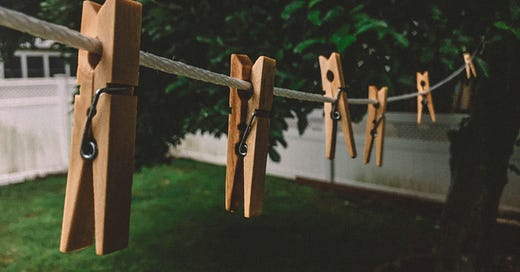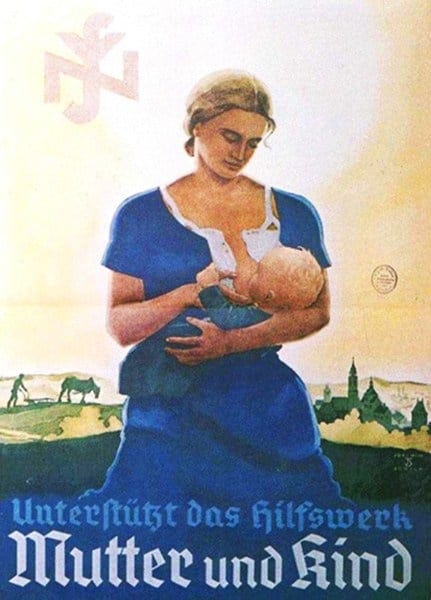
Is there anything as pointless as doing the dishes? With four humans and two cats in the house, it’s a rare hour that sees our countertops uncluttered by crockery. I can count on my tween for one dishwasher unload per day, otherwise it’s usually on me to scrape, load, and unload, not to mention baby the precious cast-iron pans that require a cleaning and re-seasoning regimen bordering on witchcraft.
The cycle of dishwashing is so unsatisfying because it is so rarely ever done. Something is always drying or waiting to be put away. As soon as everything is finally clean, one of my kids will make a snack using three plates and five different utensils, or my husband will channel his inner Emeril and decide dinner prep requires every bowl in the cabinet for his mise en place.
Dishwashing is a prime example of the much-maligned, oft-ignored category of maintenance work. One of the most compelling sections of Angela Garbes’ excellent, Essential Labor: Mothering as Social Change, is devoted to examining the idea of mothering as maintenance. In our culture, we value building new things but not maintaining them once they’re completed. Politicians race to build new stadiums and bridges but fail to allocate enough money to maintain our roads and sewers. It’s become a recurring joke during the last two presidencies that every week is “Infrastructure Week” and still we have bridges crumbling into bodies of water.
Most domestic work is maintenance work. Caring for children and the elderly is repetitive, so are most of the tasks which now fall under the umbrella term, #adulting. When it comes to maintenance work, either we must designate someone to do it, or simply declare it “unimportant” and try to get by without it. Either the invisible labor of delegating all household tasks, or sweeping all these tasks under the rug. Both have their pitfalls, and neither liberals nor conservatives seem to offer good solutions.
In the conservative Christianity I was raised in claimed to value the work of “homemaking” while saying that it was so important that men couldn’t possibly be bothered to do it! Meanwhile second-wave feminism touts the importance of women working outside the home but fails to account for the fact that someone needs to watch the kids, buy groceries, cook dinner, and make the dentist appointments. In many privileged households, that someone is often an underpaid immigrant woman. In others, women pick up the “second shift” after their nine-to-five is over, a recipe for burnout.
In light of all this, is it really that surprising that Trad Wives and #softlife are having a moment? There’s a lot to mock about this movement, certainly—it’s often delusionally aspirational not to mention creepy, falling somewhere between Stepford Wives and the Third Reich’s idealization of Aryan mothers.
But I also wonder if Trad Wives’ popularity isn’t a sign that more women are recognizing the failures of capitalism-aligned feminism. We tried to #girlboss until we hit the glass ceiling, we went through #metoo experiences, and now we want to just run off to a picturesque farmhouse and bake bread all day. It’s a fantasy, sure, but the desire comes from a real place.
What would it take for our culture to value maintenance work? How can we, ourselves, change how we view this work? Can maintenance work ever be enjoyable?
One glimmer of hope I have is the “errand hang” where friends get together to complete errands or chores together. It reminds me of the story behind one of my favorite soul food dishes, red beans and rice. Back in the day, southern women would often get together on Mondays to do laundry. They’d take Sunday’s leftover hambones and throw them in a pot of red beans and vegetables to simmer next to their washing. Frankly, it sounds amazing.
I recognize that I’m part of the problem. I’ve allowed for value capture—I value writing and activism much more than maintenance work, so I often rush through errands and chores. Going to Costco with a friend is slower, but it’s also more enjoyable. And post-COVID, I’m trying to get together with a friend at least once a week in person. So I’m going to give errand hangs a try. Maybe they’ll even wash cast-iron with me?
What is your least favorite chore? Do you value “maintenance work”? What would it take for our culture to value maintaining old things as much as making new ones?
BONUS MATERIALS:
short video “There is a Kind of Love Called Maintenance”
are any of your local bridges about to collapse? You can check here.
How many lives are saved by toilets and proper sanitation? Probably a billion.





Over the course of our 33 year marriage, my wife and I have generally split duties pretty evenly, with her sometimes taking up more and me doing the same. But in the last year, I’ve become the “trad wife,” at least when it comes to cooking: I plan all the meals, do all the grocery shopping, and do nearly all the cooking (seriously, 98%). Sara is delighted with the arrangement: she gets to focus intently on her commitment to becoming a better artist without ever wondering about what’s for dinner. I call her when dinner is ready, and keep the fridge stocked with soup and leftovers that we can eat for lunch. The funny thing is, I’m delighted with it too: I really like to cook but more so, I like to determine what we eat, to shape our meals to match my palate. It took me a while to lean into this, but these days I just really slow down and enjoy all the maintenance work of keeping us fed. [Note: when the meal is over, I walk away. She does all the dishes and cleans the countertops, which I hate doing. And she’s perfectly happy with this.]
If I could outsource one domestic task it would be meal planning/grocery shopping - if someone could just tell me what to make with a fridge full of ingredients I think I would enjoy cooking. My friends and I joke that we wish we had wives - to know that when you leave a chore undone, someone is coming behind to finish it…when you’re folding laundry, you know someone else is making dinner. My spouse does a LOT around the house, and helps when I ask…but it would be magical to have another adult anticipating things. Also I have been longing more and more for communal living - cooking shared meals, doing laundry together, shopping etc. I’m sure I’m idealizing it and there would be lots of annoying/difficult things about it but I am tired of doing it all.